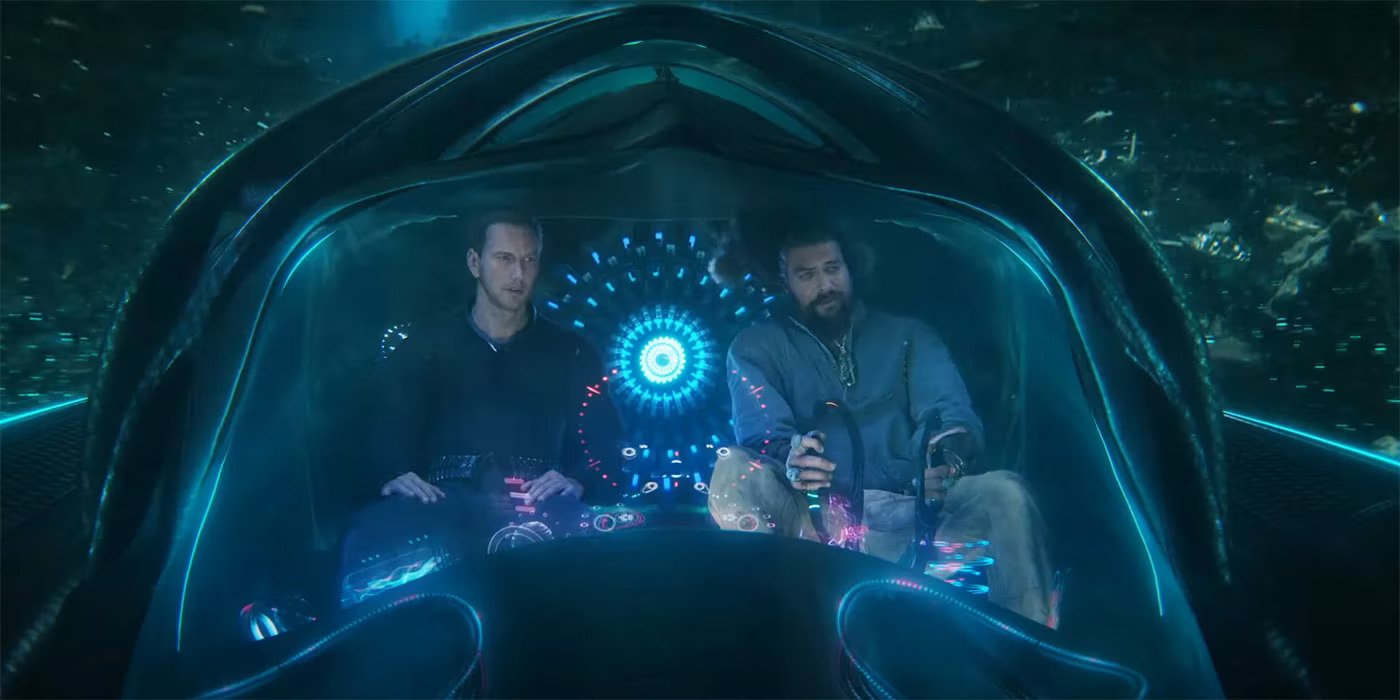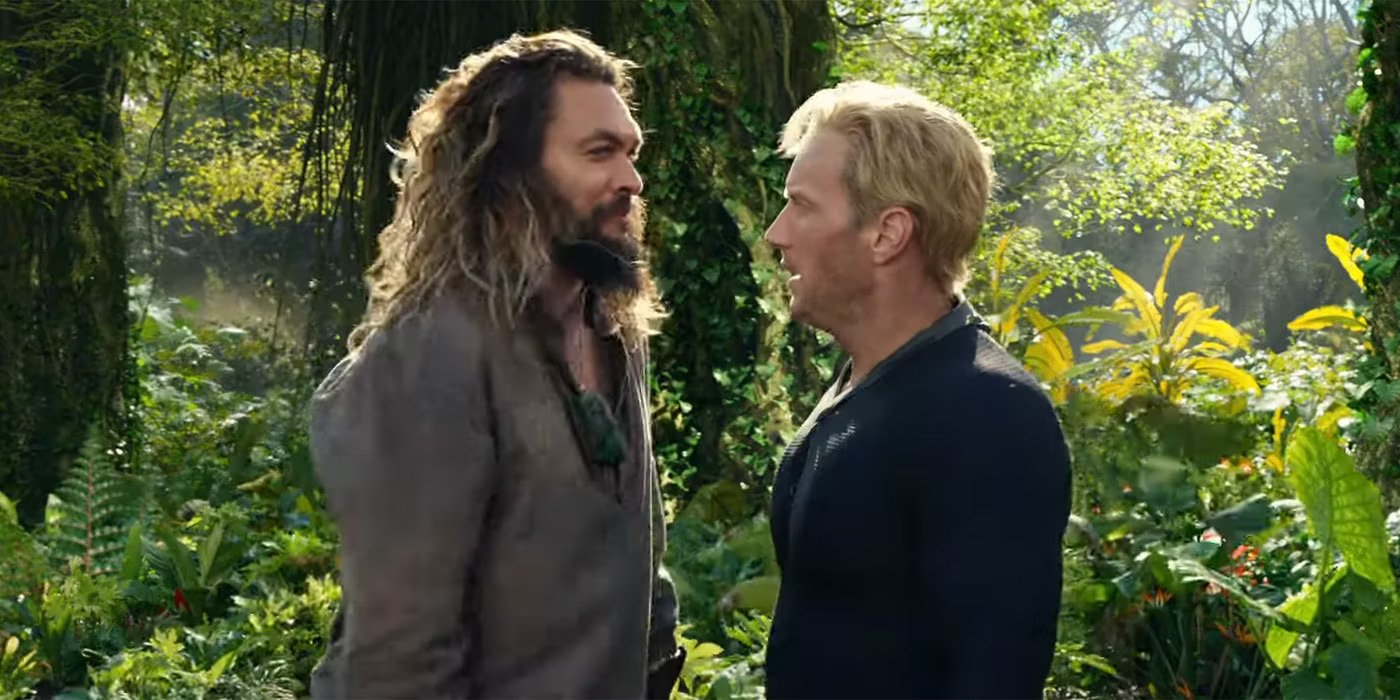‘Aquaman and the Lost Kingdom’ Waves Goodbye to Jason Momoa and the DCEU | Review
Image via Warner Bros.
After ten long years, the DCEU has finally come to a close with the premiere of Aquaman and the Lost Kingdom, but the long-awaited sequel to the billion-dollar blockbuster Aquaman isn’t interested in tying up the loose ends left behind by The Flash’s mid-credit scenes or Wonder Woman 1984’s unfinished trilogy. Instead, James Wan’s film is solely focused on bringing Arthur Curry’s (Jason Momoa) story to a heartfelt end.
Aquaman and the Lost Kingdom opens with a clever recap of the events preceding it, as told by a beleaguered Arthur who is balancing superhero duties, kingly duties, and fatherhood like a champ. After dethroning his quarrelsome half-brother Orm (Patrick Wilson) in Aquaman, Arthur and Mera (Amber Heard) got married and had a baby named Arthur Jr. (or “Junior,” as they affectionately call him). They seem to split their time between the ocean and the surface, with Arthur and his father Tom (Temuera Morrison) providing a significant amount of care to the landlubber baby. However, the film does establish that the baby shares some of his father’s attributes—even if he’s too young to make it beneath the sea.
In addition to getting caught up with Arthur and Mera’s almost picture-perfect life, Aquaman and the Lost Kingdom quickly establishes that it fully intends to pay off the post-credit scene from Aquaman. Dr. Shin (Randall Park, who seems perpetually stuck as the over-eager sidekick in superhero franchises) has been aiding and abetting David Kane’s (Yahya Abdul-Mateen II) obsessive pursuit to find ancient technology that will help him kill Aquaman once and for all. In the first film, Arthur made an enemy out of Kane when he killed his father, prompting the younger mercenary to take up arms and become the vengeful Black Manta.
The first act of Aquaman and the Lost Kingdom can be a bit of a slog as it lays out all of the information that audiences need to know about the past and present world state. Part of this is due to the fact the film—which was originally slated to premiere last December—is arriving five years after Aquaman swam into theaters. Audiences have probably forgotten a lot of the finer details about Arthur’s story. It also doesn’t help that there’s a sort of nihilistic emotion swirling around the film. It’s the final film in the DCEU and, for a lot of people, it doesn’t really “matter” in a larger sense. It’s not building to anything, and that’s what makes it great. Rather than getting bogged down in the “big picture” of the DCEU, this film is solely focused on its main character and those directly involved in his personal story. This is why the second act, where things really pick up for the film, takes it from an okay film to a swimmingly good time.
The growing situation with Black Manta, finds Arthur out of his depth as a leader and it pushes him to track down where Orm is being held in prison. Orm might have bad blood with his half-brother, but Arthur holds no ill will towards the man who was raised to hate his very existence. Through the forced proximity of their situation and Orm’s time in isolation, the brothers slowly begin to mend their fractured relationship, which the film uses as a neat parallel to the actual big bad puppetting Black Manta’s actions.
When Kane found the Black Trident buried within the melting ice caps, he became possessed by the King of Necrus (Pilou Asbæk), who quarreled with his brother King Atlan (Vincent Regan), forged the Black Trident, and drove his entire kingdom to ruin with his corrupted powers. It’s a neat little parallel that arrives in the film’s second act and it ultimately pushes Arthur and Orm’s plot lines forward in a lot of compelling ways.
Patrick Wilson Is the MVP of ‘Aquaman and the Lost Kingdom’
Image via Warner Bros.
Even in the first Aquaman, Patrick Wilson’s performance was leagues beyond the performances of his peers, but with The Lost Kingdom, his skill as an actor is even more obvious. By design, Orm is a man of few words. Where Arthur is unrestrained, loud-mouthed, and very brash—Orm is reserved, thoughtful with his responses, and very quiet. While their dynamic works quite well with the buddy-cop styling of the sequel, it also forces Wilson to do a lot of subtle things with his performance.
Aquaman and the Lost Kingdom may be Momoa’s final outing as Arthur Curry and thus, the final chapter in the character’s story, but he undergoes the least amount of development from Act 1 to Act 3. Whereas Orm goes on an entire journey of understanding, with a through-line running all the way back to the first film. The plot forces him to reassess his preconceived notions about his half-brother, reconsider his feelings about the surface and humans, and actively choose to be a better person. What’s remarkable is that so much of the development isn’t necessarily there in the dialogue, or even in the showy action sequences, but it is all there in Wilson’s physical performance. The best moments, in fact, are reserved for the little looks, subtle smirks, and understanding that Wilson shows through his facial expressions.
That’s not to say that Momoa isn’t consistently great with Arthur. He has been one of the more enjoyable characters in the DCEU, despite his scattershot appearances. But Arthur Curry is the lovable, overly friendly dog that is just bound and determined to win over Orm’s disinterested cat. You can always count on Momoa for bawdy laughs, physical humor, and the sweet bond he shares with Morrison’s Tom.
‘Aquaman’s Sequel Feels Like a True Comic Book Movie
Image via Warner Bros.
Aquaman and the Lost Kingdom feels like the “good old days” of comic book movies. David Leslie Johnson-McGoldrick’s script consistently doles out corny jokes, well-timed quips, and humorous snark; while delivering believable stakes, heartfelt emotion, and interpersonal conflict. Coupled with the thrilling action sequences and impressive VFX visuals—the film doesn’t leave much to be desired. The only thing that could’ve made it better, would’ve been a critics’ screening that wasn’t in headache-inducing 3D.
The DCEU films—like their MCU peers—have struggled to find a consistent tone within the shared universe. But both Aquaman films have delivered the same level of quality in their storytelling and styling. Jason Momoa’s Arthur Curry has always been larger-than-life, using his bravado and drunken carousing to mask his insecurities with his dual identities as a human and Atlantean. Arthur may not go on a profound or transformative journey in either movie, but at least he’s been consistently the same character. When situations get difficult or tensions flare, he’s ready with a disarming grin, a toss of his hair, or a well-placed pop culture reference that flies right over poor Orm’s head.
Without the need for a star-studded final act or a tantalizing mid-credit scene to bait audiences into watching the next film, James Wan was allowed to give Aquaman and the Lost Kingdom a true and satisfying conclusion. The DCEU may not have been given the chance to give any real closure to the heroes we came to love (and hate), but at least Arthur Curry got to have his happily ever after.
Aquaman and the Lost Kingdom is in theaters today. Find your local showtimes and check out the trailer below:
FINAL VERDICT: B+



